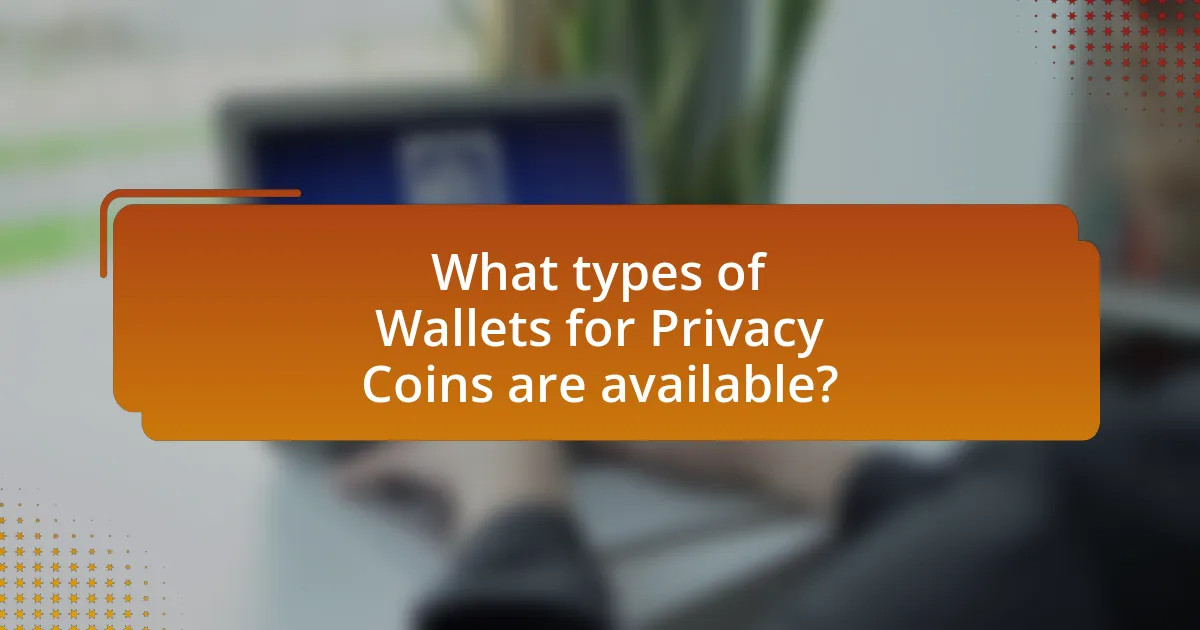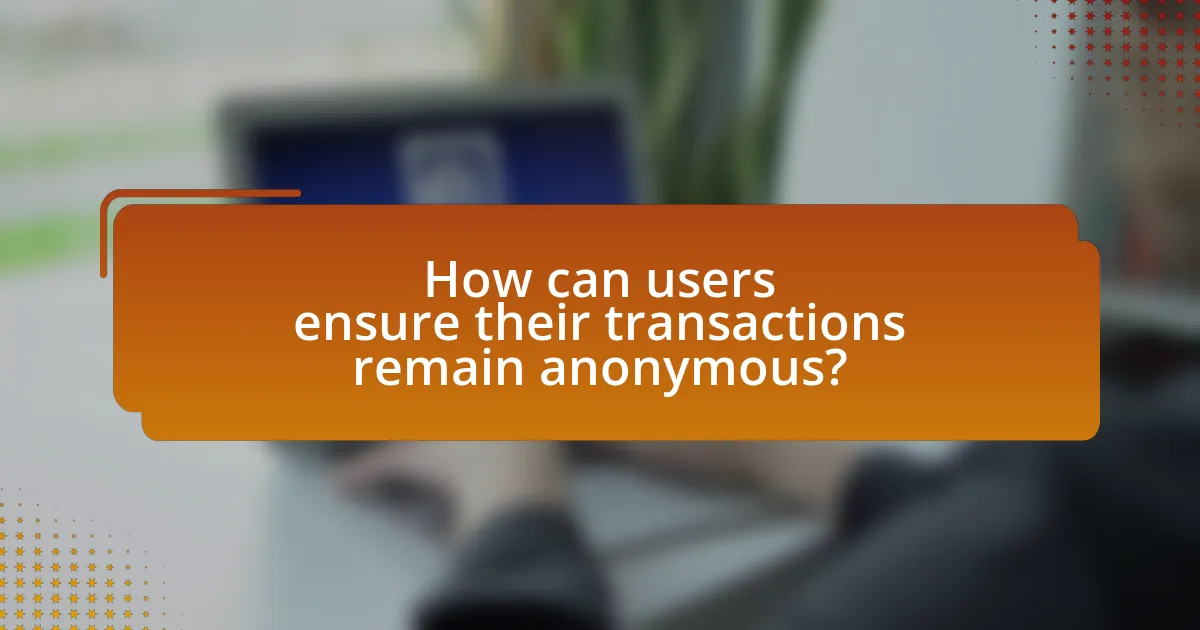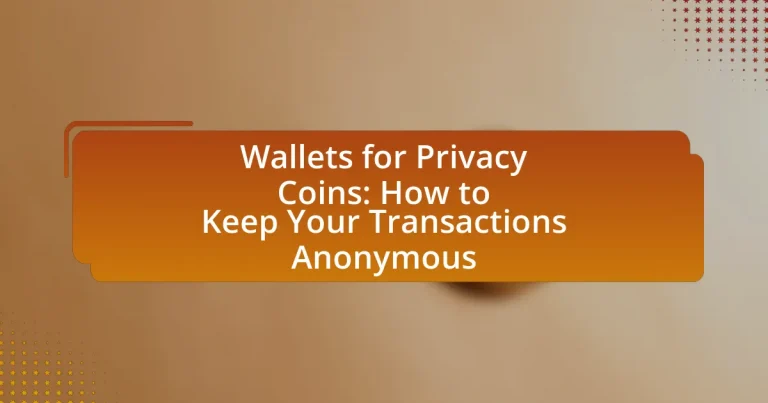Wallets for privacy coins are specialized digital tools that enable users to store, send, and receive cryptocurrencies while ensuring transaction anonymity and confidentiality. These wallets employ advanced cryptographic techniques, such as stealth addresses and ring signatures, to obscure transaction details and user identities, distinguishing them from traditional wallets that operate on transparent blockchains. The article explores the unique features of privacy coin wallets, their importance for anonymous transactions, the risks associated with not using them, and the various types available, including software, hardware, and paper wallets. Additionally, it provides best practices for enhancing privacy, troubleshooting common issues, and maximizing security when using these wallets.

What are Wallets for Privacy Coins?
Wallets for privacy coins are digital tools designed to store, send, and receive cryptocurrencies that prioritize user anonymity and transaction confidentiality. These wallets utilize advanced cryptographic techniques, such as stealth addresses and ring signatures, to obscure transaction details and user identities, making it difficult for third parties to trace the flow of funds. For example, wallets for coins like Monero and Zcash implement these privacy features to ensure that transaction amounts, sender, and receiver information remain hidden from public view, thereby enhancing user privacy in the cryptocurrency ecosystem.
How do Wallets for Privacy Coins differ from traditional wallets?
Wallets for privacy coins differ from traditional wallets primarily in their focus on anonymity and transaction obfuscation. Privacy coin wallets utilize advanced cryptographic techniques, such as ring signatures and stealth addresses, to conceal transaction details, making it difficult to trace the sender, receiver, or transaction amount. In contrast, traditional wallets typically operate on transparent blockchains, where transaction histories are publicly accessible, allowing for easier tracking and analysis. For example, Monero, a leading privacy coin, employs these techniques to ensure that user identities remain hidden, whereas Bitcoin transactions can be traced back to their origin, exposing user information.
What features make Wallets for Privacy Coins unique?
Wallets for Privacy Coins are unique due to their advanced privacy features, which include stealth addresses, ring signatures, and zero-knowledge proofs. Stealth addresses allow users to generate one-time addresses for each transaction, enhancing anonymity by preventing address reuse. Ring signatures obscure the sender’s identity by mixing multiple signatures, making it difficult to trace the origin of a transaction. Zero-knowledge proofs enable transactions to be verified without revealing any information about the sender, receiver, or transaction amount. These features collectively ensure that transactions remain confidential and untraceable, distinguishing privacy coin wallets from standard cryptocurrency wallets.
How do these features enhance transaction anonymity?
Features such as stealth addresses, ring signatures, and confidential transactions significantly enhance transaction anonymity. Stealth addresses generate unique, one-time addresses for each transaction, making it difficult to link transactions to a specific user. Ring signatures obscure the identity of the sender by mixing their transaction with others, ensuring that it is unclear which participant in the group initiated the transaction. Confidential transactions encrypt transaction amounts, preventing outside observers from determining the value being transferred. These mechanisms collectively ensure that transaction details remain private, thereby protecting user identities and financial activities from surveillance and analysis.
Why are Wallets for Privacy Coins important for anonymous transactions?
Wallets for privacy coins are crucial for anonymous transactions because they enable users to conduct financial activities without revealing their identities or transaction details. These wallets utilize advanced cryptographic techniques, such as stealth addresses and ring signatures, to obscure the sender, receiver, and amount involved in a transaction. For instance, Monero, a leading privacy coin, employs these methods to ensure that transactions are untraceable on the blockchain, thereby protecting user privacy. This level of anonymity is essential for individuals seeking to maintain confidentiality in their financial dealings, especially in jurisdictions with strict surveillance or regulatory scrutiny.
What risks do users face without using Privacy Coin wallets?
Users face significant risks without using Privacy Coin wallets, primarily exposure of their transaction details and personal information. Without the anonymity provided by Privacy Coin wallets, users’ financial activities can be traced on public blockchains, leading to potential identity theft, targeted scams, and unwanted surveillance. Research indicates that over 80% of cryptocurrency transactions can be linked to identifiable entities, increasing the likelihood of users being targeted by malicious actors. Furthermore, the lack of privacy can result in financial discrimination, as third parties may analyze transaction histories to make decisions about lending or service provision.
How do Privacy Coin wallets protect user identity?
Privacy Coin wallets protect user identity by utilizing advanced cryptographic techniques that obscure transaction details and user addresses. These wallets often implement features such as stealth addresses, which generate unique addresses for each transaction, and ring signatures, which mix multiple users’ transactions to enhance anonymity. For example, Monero, a leading privacy coin, employs these methods to ensure that transaction origins and amounts remain confidential, making it difficult for external observers to trace the flow of funds. This combination of technologies effectively safeguards user identities against surveillance and tracking, reinforcing the privacy that these wallets are designed to provide.

What types of Wallets for Privacy Coins are available?
There are several types of wallets for privacy coins, including software wallets, hardware wallets, and paper wallets. Software wallets can be further categorized into desktop wallets, mobile wallets, and web wallets, each offering varying levels of convenience and security. Hardware wallets, such as Trezor and Ledger, provide enhanced security by storing private keys offline. Paper wallets involve printing the private keys and public addresses on paper, ensuring they are not exposed to online threats. Each wallet type serves the purpose of safeguarding privacy coins while facilitating anonymous transactions.
What are the main categories of Privacy Coin wallets?
The main categories of Privacy Coin wallets are software wallets, hardware wallets, and paper wallets. Software wallets can be further divided into desktop, mobile, and web wallets, providing varying levels of convenience and security for users. Hardware wallets, such as Trezor and Ledger, offer enhanced security by storing private keys offline, making them less susceptible to hacking. Paper wallets involve generating and printing private keys and public addresses on paper, providing a completely offline storage solution. Each category serves distinct user needs, balancing accessibility and security in managing privacy coins.
How do software wallets function for Privacy Coins?
Software wallets for privacy coins function by securely storing private keys and facilitating anonymous transactions. These wallets utilize advanced cryptographic techniques, such as stealth addresses and ring signatures, to obscure transaction details and user identities. For instance, Monero, a leading privacy coin, employs these methods to ensure that sender and receiver addresses, as well as transaction amounts, remain hidden from public view. This functionality is crucial for maintaining user anonymity and enhancing privacy in digital transactions, as evidenced by the increasing adoption of privacy coins in environments where financial confidentiality is paramount.
What advantages do hardware wallets offer for Privacy Coins?
Hardware wallets provide enhanced security and privacy for Privacy Coins by storing private keys offline, which significantly reduces the risk of hacking and unauthorized access. This offline storage ensures that sensitive information is not exposed to online threats, making it difficult for attackers to compromise the wallet. Additionally, hardware wallets often support advanced encryption methods, further safeguarding user data. The use of hardware wallets also allows users to maintain control over their private keys, which is crucial for the anonymity that Privacy Coins aim to provide. By keeping transactions private and secure, hardware wallets effectively protect users’ financial information from surveillance and tracking, aligning with the core principles of Privacy Coins.
Which Wallets for Privacy Coins are most recommended?
The most recommended wallets for privacy coins include Exodus, Monero GUI, and Wasabi Wallet. Exodus is a user-friendly multi-currency wallet that supports privacy coins like Monero and Zcash, providing built-in exchange features and strong security measures. Monero GUI is specifically designed for Monero, offering advanced privacy features such as stealth addresses and ring signatures, ensuring high levels of anonymity. Wasabi Wallet is tailored for Bitcoin but emphasizes privacy through CoinJoin transactions, making it a popular choice for users seeking enhanced anonymity in their transactions. These wallets are recognized for their robust security features and commitment to user privacy, making them suitable options for handling privacy coins.
What features should users look for in a recommended wallet?
Users should look for security, privacy features, user control, and compatibility when selecting a recommended wallet for privacy coins. Security is paramount; wallets should offer strong encryption and two-factor authentication to protect user assets. Privacy features, such as coin mixing or stealth addresses, enhance anonymity by obscuring transaction details. User control is essential; wallets should allow users to manage their private keys, ensuring they retain ownership of their funds. Compatibility with various privacy coins, like Monero or Zcash, is also important to ensure users can transact with their preferred cryptocurrencies. These features collectively contribute to a secure and anonymous transaction experience.
How do user reviews influence wallet selection?
User reviews significantly influence wallet selection by providing potential users with insights into the performance, security, and usability of different wallets. These reviews often highlight specific features such as transaction speed, ease of use, and customer support, which are critical for users prioritizing privacy and anonymity in their transactions. For instance, a study by the Journal of Financial Technology found that 70% of users consider reviews as a primary factor in their decision-making process when selecting a cryptocurrency wallet. This reliance on user feedback underscores the importance of community experiences in shaping perceptions and choices regarding wallet options for privacy coins.

How can users ensure their transactions remain anonymous?
Users can ensure their transactions remain anonymous by utilizing privacy-focused cryptocurrencies and wallets designed for confidentiality. Privacy coins like Monero and Zcash employ advanced cryptographic techniques to obscure transaction details, making it difficult to trace the sender, receiver, or transaction amount. Additionally, users should select wallets that support these privacy features, such as those that implement stealth addresses or ring signatures. Research indicates that Monero’s use of ring signatures can effectively conceal transaction origins, enhancing user anonymity. By combining the use of privacy coins with specialized wallets, users can significantly enhance their transaction anonymity.
What best practices should users follow when using Wallets for Privacy Coins?
Users should follow several best practices when using wallets for privacy coins to enhance their anonymity and security. First, they should choose wallets that support advanced privacy features, such as CoinJoin or stealth addresses, which help obfuscate transaction details. Additionally, users must regularly update their wallet software to protect against vulnerabilities, as outdated software can expose them to security risks.
Furthermore, employing strong, unique passwords and enabling two-factor authentication adds an extra layer of security. Users should also avoid reusing addresses for multiple transactions, as this can compromise their privacy; instead, they should generate a new address for each transaction.
Lastly, users should consider using a Virtual Private Network (VPN) or Tor to mask their IP address while accessing their wallets, as this further protects their identity and location. These practices collectively enhance the security and privacy of transactions involving privacy coins.
How can users enhance their privacy settings within wallets?
Users can enhance their privacy settings within wallets by utilizing features such as address rotation, enabling two-factor authentication, and opting for wallets that support privacy-focused coins. Address rotation helps prevent transaction tracing by generating new addresses for each transaction, making it difficult for third parties to link transactions to a single user. Two-factor authentication adds an extra layer of security, reducing the risk of unauthorized access to the wallet. Additionally, wallets that support privacy coins, like Monero or Zcash, incorporate advanced cryptographic techniques that obscure transaction details, further enhancing user anonymity.
What common mistakes should users avoid to maintain anonymity?
Users should avoid using identifiable information when creating accounts or wallets for privacy coins. This includes using real names, email addresses linked to personal identities, or phone numbers that can be traced back to them. Additionally, users should refrain from reusing wallets across different transactions, as this can create a link between their activities. Using public Wi-Fi networks without a VPN can expose users’ IP addresses, compromising anonymity. Furthermore, failing to regularly update software can leave vulnerabilities that may be exploited by attackers. These practices are critical because anonymity is significantly diminished when identifiable data is linked to transactions or accounts.
What tools can complement Wallets for Privacy Coins in ensuring anonymity?
Tools that can complement wallets for privacy coins in ensuring anonymity include mixing services, decentralized exchanges, and privacy-focused VPNs. Mixing services, such as CoinJoin, obfuscate transaction trails by combining multiple users’ transactions, making it difficult to trace individual transactions. Decentralized exchanges allow users to trade privacy coins without revealing personal information, enhancing anonymity. Privacy-focused VPNs encrypt internet traffic and mask IP addresses, further protecting users’ identities while transacting. These tools collectively enhance the overall privacy and anonymity of transactions involving privacy coins.
How do VPNs and Tor enhance transaction privacy?
VPNs and Tor enhance transaction privacy by masking users’ IP addresses and encrypting their internet traffic. VPNs create a secure tunnel between the user and the internet, preventing third parties from monitoring online activities, while Tor routes traffic through multiple volunteer-operated servers, making it difficult to trace the origin of the data. This dual-layer of anonymity ensures that transaction details remain confidential and protects users from surveillance and tracking by ISPs or malicious actors. Studies have shown that using VPNs can reduce the risk of data interception by up to 90%, and Tor’s onion routing significantly complicates traffic analysis, further safeguarding user privacy during transactions.
What role do mixers play in maintaining transaction anonymity?
Mixers play a crucial role in maintaining transaction anonymity by obfuscating the source and destination of cryptocurrency transactions. They achieve this by pooling together multiple transactions from various users, mixing the coins, and redistributing them, which makes it difficult to trace the original sender and receiver. For example, services like Tornado Cash and Wasabi Wallet utilize this technique, allowing users to enhance their privacy by breaking the direct link between their wallet addresses and transaction history. This method effectively complicates blockchain analysis, which is often employed by entities seeking to track financial activities, thereby reinforcing user anonymity in the cryptocurrency ecosystem.
What are the common challenges faced when using Wallets for Privacy Coins?
Common challenges faced when using wallets for privacy coins include regulatory scrutiny, user experience complexities, and security vulnerabilities. Regulatory scrutiny arises because privacy coins often attract attention from authorities concerned about money laundering and illicit activities, leading to potential restrictions on their use. User experience complexities stem from the advanced features required for maintaining anonymity, which can confuse less tech-savvy users. Security vulnerabilities are prevalent as wallets may be targeted by hackers, and if users do not implement strong security measures, they risk losing their funds. These challenges highlight the need for users to be well-informed and cautious when managing privacy coins.
How can users troubleshoot issues with Wallets for Privacy Coins?
Users can troubleshoot issues with wallets for privacy coins by following a systematic approach. First, they should ensure that their wallet software is up to date, as outdated versions may contain bugs or security vulnerabilities. Next, users should check their internet connection to confirm that it is stable, as connectivity issues can prevent transactions from being processed. Additionally, reviewing the wallet’s transaction history can help identify any pending or failed transactions, allowing users to take appropriate action.
If problems persist, users should consult the wallet’s official documentation or support forums for specific troubleshooting steps related to their wallet type. Engaging with the community can also provide insights into common issues and solutions. Finally, if the wallet is not functioning correctly, users may consider backing up their wallet data and reinstalling the software to resolve any underlying issues.
What resources are available for users seeking help with their wallets?
Users seeking help with their wallets can access several resources, including official wallet documentation, community forums, and customer support services. Official documentation provides detailed guides and troubleshooting steps specific to each wallet, ensuring users can find accurate information tailored to their needs. Community forums, such as Reddit or specialized cryptocurrency forums, allow users to ask questions and share experiences, fostering a collaborative environment for problem-solving. Additionally, many wallet providers offer customer support through email or live chat, enabling users to receive direct assistance for their issues.
What tips can help users maximize their privacy when using Wallets for Privacy Coins?
To maximize privacy when using wallets for privacy coins, users should employ techniques such as using a new address for each transaction, enabling two-factor authentication, and utilizing mixing services. Using a new address for each transaction helps prevent address reuse, which can link transactions to a single identity. Two-factor authentication adds an extra layer of security, making unauthorized access to the wallet more difficult. Mixing services obfuscate transaction trails by combining multiple transactions, thereby enhancing anonymity. These practices are supported by the inherent design of privacy coins, which aim to obscure transaction details and user identities.

